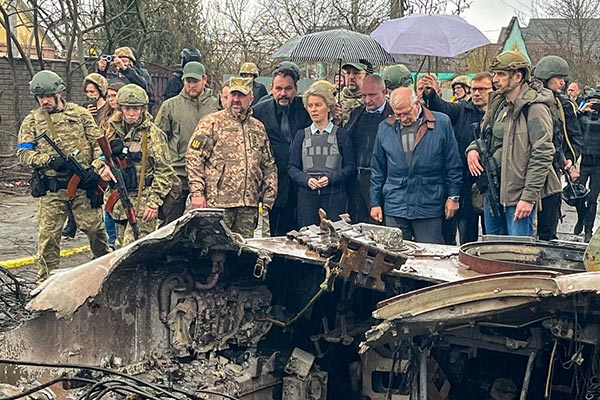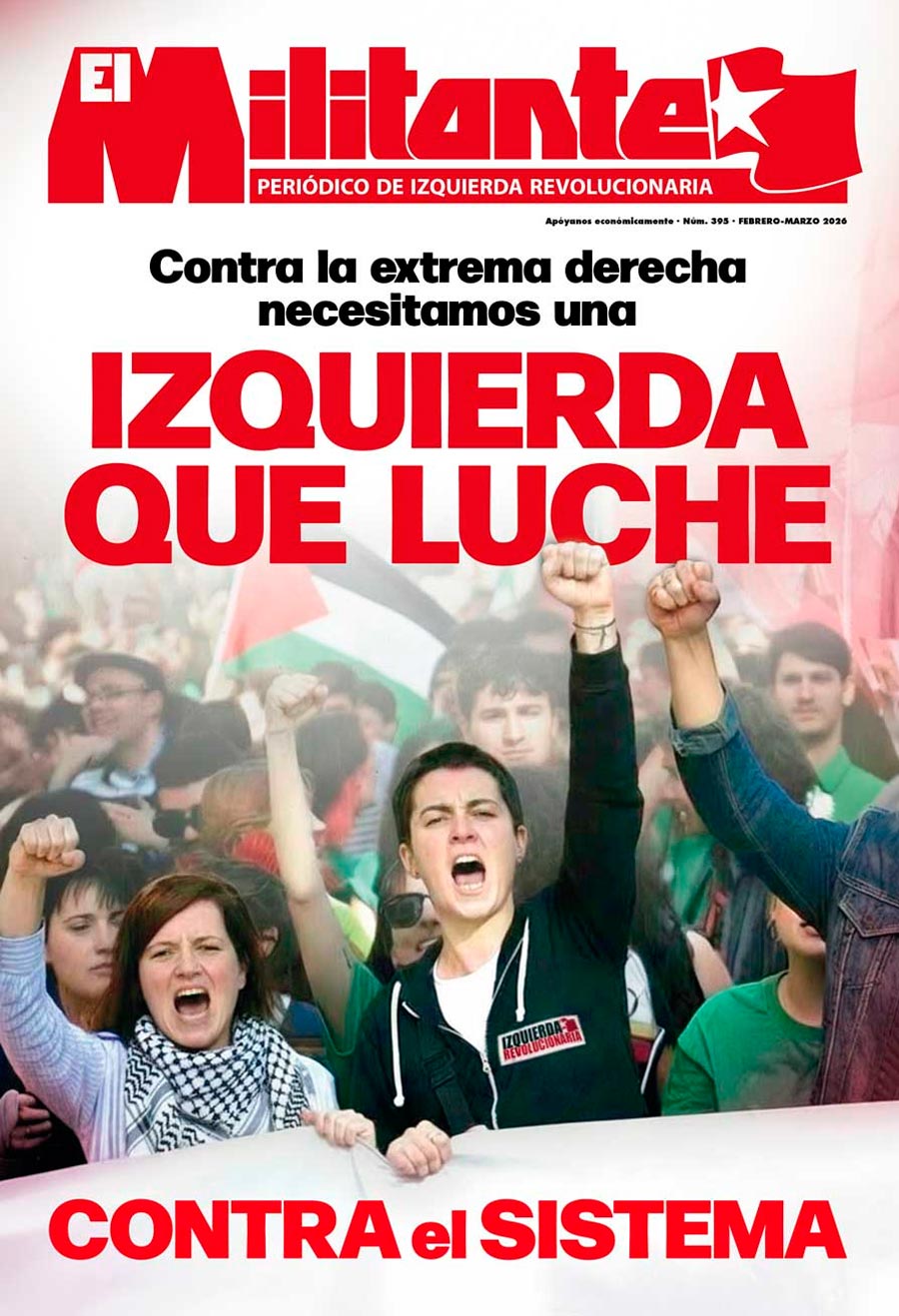The war in Ukraine has exposed the deep contradictions hitting global capitalism, opening up a political, economic and social crisis unprecedented since the 1930s. A crisis which the governments will place on the shoulders of the working class and which will have enormous consequences for the world class struggle.
As we have discussed in previous statements, the fierce battle being waged in Ukraine goes far beyond the Russian military invasion at the end of February. In reality it has been brewing since 2014 and has taken a qualitative leap into a military confrontation between Putin's reactionary regime in one side US and European imperialism and the puppet Zelensky government in the other.
As if it were a last chance to re-establish their hegemonic position, Biden and the US bourgeoisie are bringing the European Union to its knees to accept their militarist agenda. They intend to bog Russia down in a war of attrition and use it to contain the rise of China. But this strategy, which uses the Ukrainian people as cannon fodder without sending a single Western soldier to the theatre of operations, could backfire: Ukraine will be devastated and the world economy will suffer a new descent into hell.
As NATO Secretary General Jens Stoltenberg acknowledged at the recent Davos Forum: "this is about Russia, but it is also about China", cynically arguing that "freedom is more important than free trade" and that "protecting our values is more important than profits". And he says this in front of the top executives and tycoons of the major Western banks and capitalist monopolies who are profiting from the war!
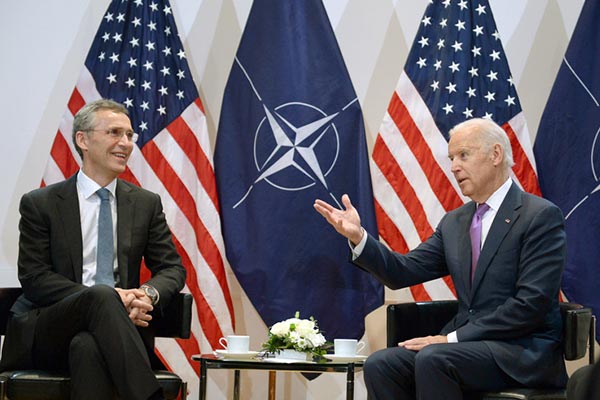
Thirty years ago, after the fall of the USSR, US imperialism, with the applause of its European allies, boasted about the triumph of free market and the defeat of "communism", and then intervened militarily wherever its geostrategic and commercial interests required it. This attitude led US imperialism to expand NATO into Eastern Europe, absorbing most of the former Warsaw Pact nations. But this impunity as a global enforcer has undergone a dramatic change since the Great Recession of 2008, when the correlation of forces underwent a profound alteration which has taken the form of China's emergence as a superpower. The powerful economic muscle of Chinese state capitalism has been translated into an aggressive imperialist policy that disputes every corner of the planet with the US giant.
Lenin pointed out the background to this in his classic text on imperialism: "Finance capital and trusts do not diminish, but increase the differences in the rate of growth of the various parts of the world economy. And once the correlation of forces has changed, what other means is there, under capitalism, to resolve the contradictions if not force? (...) What other means but war can there be under capitalism to eliminate the existing discrepancies between the development of the productive forces and the accumulation of capital, on the one hand, and the distribution of colonies and 'spheres of influence' among finance capital, on the other?"[1]
The war is leading to a hard economic recession
The war is accelerating the economic recession which was already simmering. A recession that is not only a consequence of the war, but of the severe imbalances accumulated over more than a decade, and which exploded during the last two years of the pandemic. And the aforementioned Davos Forum meeting has underlined the profound pessimism with which the representatives of big international capital face the future. Despite the propaganda, US imperialism and the European Union are showing their growing weakness.
The failure of the sanctions against Russia is the best example of this. Only 40 out of 190 countries have implemented them. The EU itself is severely constrained in implementing them by Hungary's open refusal and the reservations and hesitation of other countries to cut off Russian oil and gas supplies completely. The oil embargo agreed at the end of May excludes oil delivered by pipeline, a third of the total, affecting only shipments. But the ban on the latter, as the US and Britain are finding, has not prevented Putin's oil from ending up in their ports after resorting to the 'creative methods' of the market economy[2].
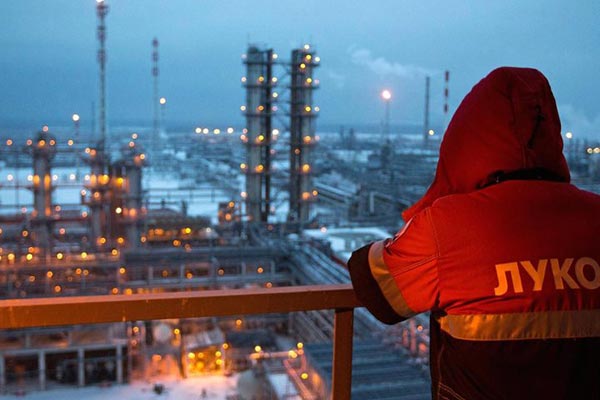
China's strong support for Russia, which in turn benefits from Moscow's supply of cheap energy and raw materials, and has achieved an excellent record for its economy in the first quarter of the year[3], is not the only one. The demand for cheap oil by many other countries, such as India[4], makes Western policy even more impotent: the escalation in oil prices that has increased with the sanctions allows Russia to compensate for the fall in its production by up to a third, especially as long as it maintains its alliance with OPEC, which continues to resist US demands for a substantial increase in global oil production.
The European Commission's own forecasts that a total cut-off of Russian gas would sink the eurozone's GDP and skyrocket the inflation[5], which has already reached a record 8.1 per cent. This highlights the serious limitations facing the US strategy. According to the German Association of Energy and Water Industries, only 12.5 per cent of Russian natural gas could be replaced in the short term in the metal industry, 7.9 per cent in general industry and only 4 per cent in the chemical industry. On the other hand, supplies from other suppliers, such as the US, will lead to a price increase of 30-40% compared to Russian gas, making European industry, and especially German industry, brutally uncompetitive on the world market against Chinese and American goods.
The dynamics of the war and its economic consequences are driving sharp divisions among European governments, with Scholz and Macron calling for Russia not to be humiliated and even signalling that Ukraine will have to make territorial concessions. But also in the US ruling class itself, unity is being lost, as reflected in a recent editorial in The New York Times[6] warning of the need to find a way out of the conflict, or the recent statements by former Secretary of State Henry Kissinger in Davos[7] that Ukraine must concede Donbas.
What is clear is that even if some kind of truce can be reached in Ukraine, the confrontation between the imperialist powers will continue, including new military conflicts. Under capitalism in its phase of imperialist decay, harmonious, peaceful and progressive development is impossible.
Speculation and world hunger: the hypocrisy of the capitalists
The war, like the pandemic before it, is boosting capitalist profits worldwide, which until March have broken records with 11% more than in 2021[8]. In addition, the inflationary escalation, which impoverishes millions of working families, is bringing skyrocketing profits to the big monopolies in energy, food and banking.

The cynicism of European Commission President, Ursula von der Leyen, and Western capitalist governments knows no bounds when they denounce Putin's regime as solely responsible for world hunger. The truth is that already in 2020 hunger reached 811 million people, 20% more than in 2019. If they were really concerned about hunger, the EU and US spokespersons should address the big investment funds that make their money by speculating on the commodity markets in Chicago, Minneapolis or Paris. That is where famines are generated!
But the situation is all the more glaring when the real facts are known. According to the FAO, the 2021/22 cereal season has reached an all-time high of 2.8 billion tonnes. Added to the existing stock, this would reach 3,626.8 million tonnes, leaving a surplus after consumption of 835 million tonnes. According to the agency, Ukraine and Russia would produce 32.5 million tonnes of wheat and corn between March and June, "6.7% of the world trade volume, 3.89% of the stocks forecast at the end of the season and 2.46% of both figures together[9]". 9]", i.e. a minority share of world production.
A report by IPES Food[10] clearly points out what is happening: "Although the war in Ukraine has created major supply disruptions and the situation continues to deteriorate, there is no global food shortage at this time (...) The real problem is that most of the world's grain stocks are in the hands of large corporations, and they have little interest in releasing those stocks or releasing them as prices continue to rise"[11].
This is why on 7 March, right at the start of the war, JP Morgan published a report encouraging investment in funds linked to the agricultural sector. In the first week of March alone, global investments reached 4.5 billion dollars, and the two main agricultural investment funds received 1.2 billion compared to 197 million for the whole of 2021[12]. The problem is not the war in Ukraine, but the suffocating control of the economy by the big monopolies and their speculative bets on the futures markets to line their pockets.
No to the imperialist war! No Putin, no NATO, no Zelenski!
The invasion of Putin's troops and the armament deployed by NATO are destroying Ukraine. It is a reactionary and imperialist war on both sides, in which the Zelensky government is not fighting for national liberation, but acting as a mere contractor for US imperialism. The state and administrative apparatus in Kiev, the Ukrainian army and the Ukrainian economy are sustained by a massive mobilisation of military and financial resources from the US, NATO and the EU.
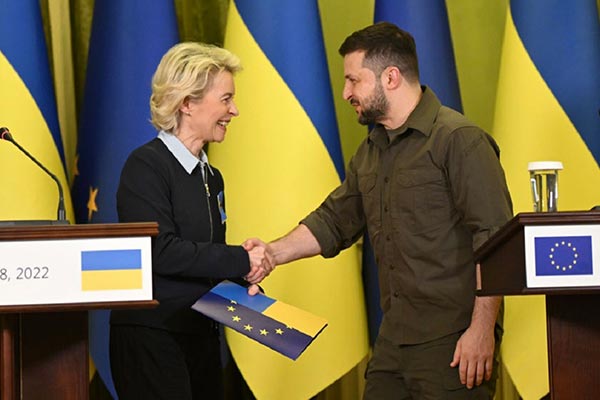
This avalanche of resources also explains the alleged Ukrainian military miracle. Since the beginning of the invasion, on February 24, this aid has multiplied on an unprecedented scale: 42,000 million euros from the US, 15,000 million from the EU and 7,000 from other allies of US imperialism (Great Britain, Canada, Japan, Australia…). In total, more than 65,000 million euros, 41% of the Ukrainian GDP in 2021! But this support has not started now. The Pentagon and NATO have been openly intervening in Ukraine since 2014, financing its army and training more than 80,000 soldiers in 8 years[13]. In practice, NATO military bases already existed on Ukrainian territory, and all this training has been carried out on them[14].
The Western narrative of how we got to this point consciously omits the crucial role of US imperialism in the escalation of the war. At the beginning of 2021, the Ukrainian government designed a new National Security doctrine agreeing to its incorporation into NATO and to the participation in its military exercises. In August of that year, the US and NATO formed the "Crimean Platform" with the aim of helping to recover the peninsula, describing it as a Russian military base that threatened NATO's security. Throughout this time, the Zelensky government increased the military deployment on the Donbas front, assigning between 120,000 and 150,000 soldiers. In early 2022, Zelensky passed a law to allow NATO troops to carry out military exercises on Ukrainian soil.
To all this must be added the deeply reactionary character of the successive Ukrainian governments since 2014, including that of Zelensky, which have applied cuts, massive privatizations and harsh anti-worker and anti-union legislation[15]. A government dominated by neo-Nazi and extreme right-wing elements, such as deputy Galina Tretyakova, from Zelenski's party, who raised the need to sterilize the unemployed since they "give poor quality children", and an army whose backbone of command and shock troops are made up of fascists and white supremacists like the Azov Battalion.
All of this does not deny the imperialist and reactionary character of Putin's invasion, his strategy of territorial annexations for the greater benefit of the big Russian capitalists and monopolies —who will be the ones who really take advantage of the military and economic control of Donbas— and the rebirth of the Great Russian chauvinism that has always oppressed Ukraine by denying its right to national independence. It is no coincidence that Putin accused Lenin and the Bolsheviks of being responsible for Ukraine's self-determination.
Anti-communism and totalitarian nationalism are hallmarks of the capitalist and bonapartist Putinist regime, which unceremoniously exploits its working class while 1% of the population monopolizes 48% of the country's wealth, and represses anyone who dissents, from the unions and the combative left, to the LGTBI movement and social movements. A regime with close ties to the European far right and that has hyper-reactionary units such as the Wagner group, with which it plans military interventions in many parts of the planet.
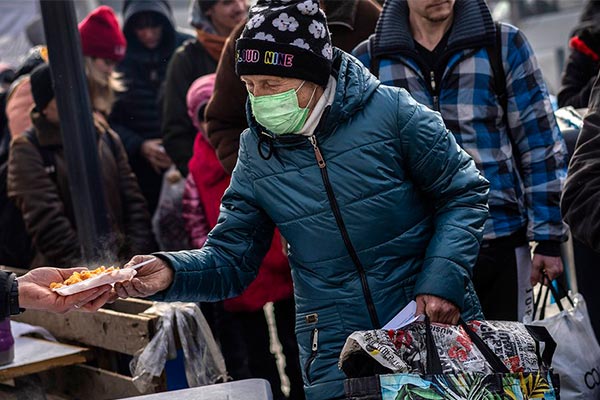
The war and its consequences are being terrible for the working class in Ukraine, in Russia and in the rest of the world. They were also in 1914, when a small group of revolutionaries cried out against the capitulation of the Second International and the socialist parties to their national bourgeoisies for their support of the massacre and their social patriotism. However, these revolutionaries, Lenin, Trotsky, Liebknecht or Rosa Luxemburg, did not give up. They knew that the war carried within it the seeds of the revolution, and that sooner or later the working class and the oppressed would rise up against imperialist barbarism.
Today, like yesterday, the leaders of traditional social democracy and also of the new reformist left, instead of standing up to their respective governments by denouncing the imperialist nature of the war, the increase in military budgets and the militarist escalation, they echo the chauvinist and warmongering propaganda, guaranteeing at all costs a policy of national unity in defense of the interests of their own bourgeoisie that will only contribute to prolonging the massacre and its dramatic consequences for the working class.
And today as yesterday, the revolutionary left with a program of class independence continues to say loud and clear: No to the imperialist war! The main enemy is at home! For proletarian internationalism, for the socialist revolution!






